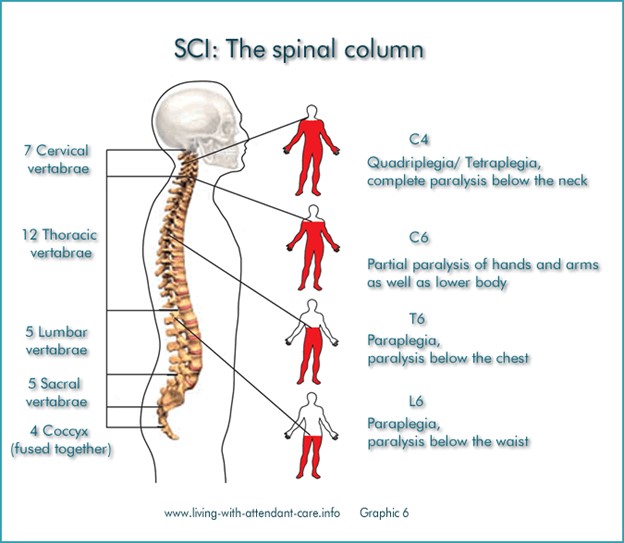A nurse is caring for a client who has a complete spinal cord injury. Based on the nurse's understanding about the degree of this type of injury, what can the nurse expect will be the client's level of function?
The client will need 24-hour a day care.
The client will be able to assist with transfer and perform self-care.
The client will be able to roll over independently.
The client will be able to drive an electric wheelchair.
The Correct Answer is A
Choice A Reason: This is the correct choice because a complete spinal cord injury is a condition where there is no motor or sensory function below the level of injury. The client will have paralysis of all four limbs (quadriplegia) and loss of bladder, bowel, and sexual function. The client will also have impaired thermoregulation, breathing, and blood pressure. The client will need 24-hour a day care to assist with mobility, hygiene, elimination, nutrition, and prevention of complications.
Choice B) Reason: This is incorrect because a client who is able to assist with transfer and perform self-care has a partial spinal cord injury, not a complete one. A partial spinal cord injury is a condition where there is some motor or sensory function below the level of injury. The degree of impairment depends on the extent and location of the damage.
Choice C Reason: This is incorrect because a client who is able to roll over independently has a lower spinal cord injury, not a complete one. A lower spinal cord injury is a condition where there is damage to the lumbar or sacral segments of the spinal cord. The client will have paralysis of the lower limbs (paraplegia) and some loss of bladder, bowel, and sexual function. The client will still have some control over the upper limbs and trunk.
Choice D Reason: This is incorrect because a client who is able to drive an electric wheelchair has an upper spinal cord injury, not a complete one. An upper spinal cord injury is a condition where there is damage to the cervical or thoracic segments of the spinal cord. The client will have paralysis of all four limbs (quadriplegia) and loss of bladder, bowel, and sexual function. However, the client may still have some movement or sensation in the shoulders, arms, or hands.

Nursing Test Bank
Naxlex Comprehensive Predictor Exams
Related Questions
Correct Answer is ["B","E","F"]
Explanation
Choice A Reason: Edema is not a specific finding of a systemic infection, but rather a possible sign of fluid overload or impaired venous return. It can occur due to excessive infusion rate, heart failure, or obstruction of blood flow in or around the central line.
Choice B Reason: This is a correct choice. Purulent drainage at intravenous insertion site is a finding of a local infection that can spread systemically. It indicates bacterial invasion and inflammation of the skin and subcutaneous tissue around the catheter.
Choice C Reason: Redness at insertion site is a finding of a local infection that can spread systemically. It indicates increased blood flow and inflammation of the skin and subcutaneous tissue around the catheter.
Choice D Reason: Nausea is not a specific finding of a systemic infection, but rather a possible side effect of parenteral nutrition or a symptom of another condition. It can occur due to electrolyte imbalance, hyperglycemia, or gastrointestinal disorders.
Choice E Reason: This is a correct choice. Leukocytosis is a finding of a systemic infection that indicates increased production and release of white blood cells in response to infection. It can be detected by a blood test.
Choice F Reason: This is a correct choice. Fever is a finding of a systemic infection that indicates increased body temperature due to activation of the immune system and release of pyrogens. It can be measured by a thermometer.
Correct Answer is A
Explanation
Choice A reason: This is the correct answer because bacterial meningitis is a medical emergency that requires immediate antibiotic therapy to prevent complications and death.
Choice B reason: This is incorrect because documenting intake and output is not a priority action for a child with bacterial meningitis. Fluid balance is important, but not as urgent as antibiotic administration.
Choice C reason: This is incorrect because reducing environmental stimuli is a supportive measure that can help reduce headache and photophobia, but it is not a priority action for a child with bacterial meningitis. The nurse should focus on preventing infection spread and monitoring for signs of increased intracranial pressure.
Choice D reason: This is incorrect because maintaining seizure precautions is a preventive measure that can help protect the child from injury, but it is not a priority action for a child with bacterial meningitis. The nurse should administer anticonvulsants as prescribed and observe for seizure activity, but the main goal is to treat the infection.
Whether you are a student looking to ace your exams or a practicing nurse seeking to enhance your expertise , our nursing education contents will empower you with the confidence and competence to make a difference in the lives of patients and become a respected leader in the healthcare field.
Visit Naxlex, invest in your future and unlock endless possibilities with our unparalleled nursing education contents today
Report Wrong Answer on the Current Question
Do you disagree with the answer? If yes, what is your expected answer? Explain.
Kindly be descriptive with the issue you are facing.
